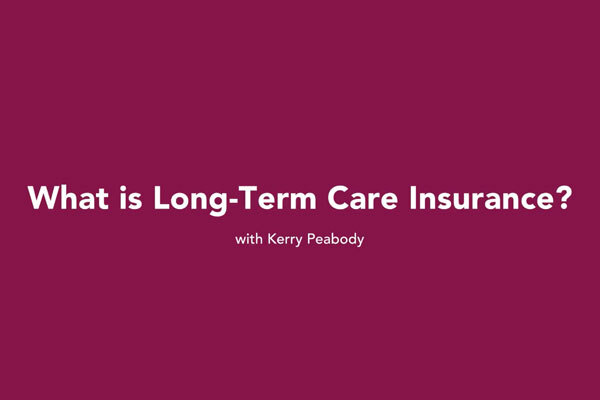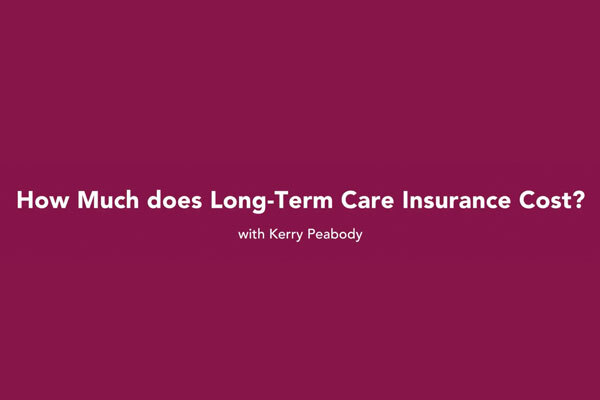
Long-Term Care Insurance
Let the Long-Term Care Specialists at Clark Insurance Educate and Guide You
You’re planning to live a long time, and the longer you live, the more likely you are to require some kind of long-term care. It’s important to understand the long term care is not medical care, it’s almost always “custodial care.” This includes help with your activities of daily living (ADLs), including bathing, dressing, feeding, toileting, transferring & continence, or it may be supervision needed because of a cognitive impairment. While most long term care is received at home, it can also be in adult day care, assisted living, hospice or a nursing home.
The question many people may ask is not, do I need long-term care, but rather, how will I pay for long-term care when it is needed? Medicare does not pay for long term care, and Medicaid will only help with long term care expenses after you’ve spent down your own assets. That means that individuals requiring long-term care must rely on savings, family, or both to provide care into the later years. The cost of that care is not inexpensive. The average monthly cost for assisted living in Maine is $5,700 per month or nearly $70,000 per year. If you require nursing home care, the cost rises to nearly $100,000 per year on average. Paying these out-of-pocket costs quickly eats into long-term savings and places a great deal of financial strain on families shouldering the burden of care. That’s where long-term care insurance comes into play.
In exchange for a premium, long-term care insurance policies pay a daily or monthly amount to cover the costs of home health, assisted living, or nursing home care. The younger and healthier you are when you put your long term care insurance in place, the less it’s going to cost, and the more options you’ll have. So, the best time to purchase a long-term care policy is often when you are 50-65 years old.

Download Our Guide
What’s your plan for long term care? Many people are turning to affordable, effective insurance options to protect themselves against a long term care expense. A well-designed long term care plan can help ensure you get the care that you deserve. Check out our guide to determine the best long term care policy for your specific needs.
Long-Term Care Insurance FAQ Videos
Kerry answers some common questions about long-term care insurance in these short videos:
Planning out your retirement? Most people don’t realize their needs might not be met with just Medicare and health insurance.
Who do you expect to take care of you as you get older? Learn more about possible gaps in Medicare or health insurance coverage.
Ever wondered what really influences the cost of a long-term care insurance plan? Don’t miss this opportunity to learn from a specialist.
Are you in retirement planning mode? Did you know that long-term care plans can be purchased as early as age 18?
Load More
There are four key components of a long-term care plan – do you know what they are?
More Frequently Asked Questions
What is Long-Term Care Insurance?
Long-term care insurance can help you stay in your own home longer, and help keep you in control of your care. Policies cover what Medicare and health insurance typically do not. Long-term care is not medical care. Rather, the vast majority of long-term care is what we call custodial care. It includes such care as assistance with tasks like bathing and dressing or supervision due to a cognitive impairment. Long-term care insurance policies typically cover care at home, adult daycare, assisted living, hospice, and nursing home care. This insurance product gives you the option of receiving care in a setting of your choice when you need it.
What Is Typically Covered in a Long-Term Care Policy?
Long-term care insurance policies pay a daily or monthly benefit to cover the cost of in-home care, adult day care services, hospice care, respite care, assisted living care, memory care, and many skilled care services for qualified policyholders. They can also help pay for things like home modifications, caregiver training – a full range of care-related services. Some policies will even allow you to pay family members and informal caregivers.
What Are the Primary Benefits of Long-Term Care Insurance Policies?
The primary benefits of long-term care insurance policies include:
- Staying in your home longer. Only 30% of all long-term care insurance claims are for nursing homes. The vast majority, 51%, are for home care. So, the main reason you should plan for LTC is so that you can stay out of the nursing home as long as possible.
- Remaining in control of care decisions writing the checks and calling the shots;
- Protecting assets that have been accumulated over a lifetime for retirement and for passing onto your loved ones and
- Reducing the burden on family. The vast majority of LTC is provided informally by unpaid family members. LTC insurance provides an opportunity to shift that role to a professional caregiver.
How Much Does Long-Term Care Insurance Cost?
Factors that control the price of long-term care insurance include the age when coverage is purchased, overall health of the policyholder, and plan design. Plan design considerations include the amount of monthly or daily benefit, the duration of the benefit period, and other contract riders. Longer benefit periods and higher daily coverage amounts increase insurance premium costs.
When Is the Best Time to Buy Long-Term Care Insurance?
Long-term care insurance policies can be purchased by policyholders from 18 years old to 79 years old. While younger is better, the best time to buy long-term care insurance is typically pre-retirement age, between 55 and 65 years old.
What Are the Four Components of Long-Term Care Insurance?
Long-term care insurance policies include:
- The benefit amount (how much the policy will pay when long-term care is needed);
- The benefit period (how long the benefit will last once benefits start);
- The deductible or elimination period (how long policyholders self-fund long-term care before the policy kicks in); and
- The inflation rider (the benefit grows over time as long-term care costs increase due to the effects of inflation).
Have another question about long-term care insurance and how to find the best plan for you? Contact our team to see how we can help!










